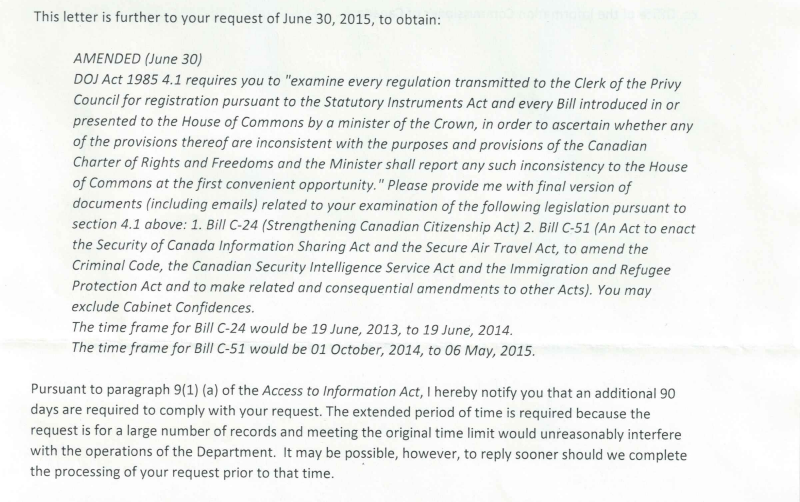Constitutionality of bills C-51 and C-24: Dept of Justice won’t release study until after election

Department of Justice has decided to not release any information related to the its examination of the controversial Conservative bills C-51 and C-24 claiming that meeting the legal deadline would “interfere” with the Department’s operations.
DOJ Act 1985 4.1 requires the Department of Justice to “examine every regulation transmitted to the Clerk of the Privy Council for registration pursuant to the Statutory Instruments Act and every Bill introduced in or presented to the House of Commons by a minister of the Crown, in order to ascertain whether any of the provisions thereof are inconsistent with the purposes and provisions of the Canadian Charter of Rights and Freedoms and the Minister shall report any such inconsistency to the House of Commons at the first convenient opportunity.”
We sent an access to information and privacy request to the Department to obtain any documents (including emails) related to the Department’s examination of the following legislation pursuant to section 4.1:
1. Bill C-24 (Strengthening Canadian Citizenship Act)
2. Bill C-51 (An Act to enact the Security of Canada Information Sharing Act and the Secure Air Travel Act, to amend the Criminal Code, the Canadian Security Intelligence Service Act and the Immigration and Refugee Protection Act and to make related and consequential amendments to other Acts).
We got a response from senior ATIP co-ordinator Stefany Hollingsworth asking “This request would include all legal opinions that were relied on in the examination of the legislation. They identified approximately 67.5 hours of search in order to retrieve the relevant documents with respect to Bill C-24, and approximately 24 hours to search through their records with respect to Bill C-51. Would you be willing to narrow down the scope of your request for only final version of the documents?”
We consented to narrowing down the scope our request, believing that the Department was acting in good faith.
We got a further email from senior ATIP co-ordinator Stefany Hollingsworth on June 30 saying “However, as you amended your request by narrowing down the scope of your request, would you allow us to restart the clock to day 1, and allow us to re-open your request under a new file number please? This is for an administrative reason, and will not affect or delay the processing of your request.”
Once again, we consented to resetting the clock, once again believing that the Department of Justice was trustworthy.
Today we got an email from Ms. Hollingsworth saying that “an additional 90 days are required to comply with your request. The extended period of time is required because the request is for a large number of records and meeting the original time limit would unreasonable interfere with the operations of the department.”
A 90-day extension means that we will only see the documents after the federal election currently slated for October 19.
Any extension must be sought within thirty days of the original requests, and had we not consented to resetting the clock, the Department would not have been able to do so.
Last year Canada’s information Commissioner Suzanne Legault found that federal ministerial staff had “…inserted themselves in various ways into a process that was designed to be carried out in an objective manner by public servants. Consequently, the rights conferred under the Act were compromised.”
In December 2012, Department of Justice lawyer Edgar Schmidt sued the Harper government for failing to adequately examine proposed bills to evaluate their compatibility with the Canadian Bill of Rights and the Canadian Charter of Rights and Freedoms, and the case will be heard in September.
Once again, the Harper Government is playing fast and loose with the Access to Information laws.
This time, perhaps, the Conservatives don’t want Canadians to know how they play fast and loose with our Charter of Rights and Freedoms.



